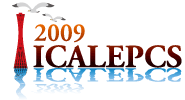ICALEPCS 2009
TUP009
Network Impact of Small and Ubiquitous Intelligent Devices
R.Petkus* (BNL)
As Ethernet connections become ubiquitous and intelligent devices proliferate, it is necessary to consider its impact on client systems and network performance. When large numbers of I/O were merged in each network node, optimizing the use of the TCP/IP packets was possible. When each I/O or small numbers of I/O become autonomous network nodes, the packet size is necessarily smaller and the TCP/IP header becomes a larger portion of the packet. As more nodes sending small packets communicate in synchronous environment, the risk of collisions and degraded performance is elevated. When clients connect to this legion of server devices, there is a surge in the number of sockets and file descriptors that need to be opened, maintained, and serviced. This work will examine the behavior of the Linux display server in the described environment, assess risk, and provide hardware and software configuration options to improve performance.

